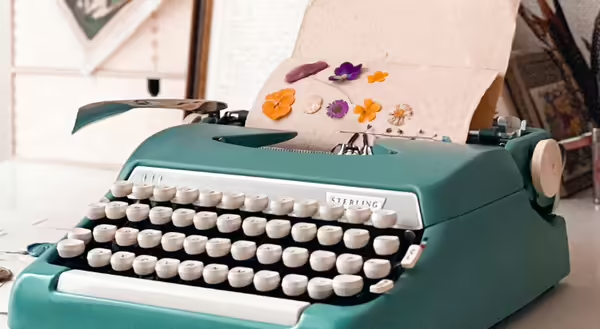
National Poetry Month, observed in April, celebrates poetry in all its forms while highlighting the importance of poets and poetry in our culture. Poetry offers a fun and imaginative way to play with words and emotions, whether through reading, writing, or performing.
This month’s tip series explores different ideas and tips for creating poetry on your own.
Start with What You Love:
Write about your favorite things—your pet, a dream, a favorite place, or even your favorite food. Poetry doesn’t have to be serious; it just has to be you!
Use Your Senses:
Make your poetry come alive by describing how things look, smell, taste, sound, and feel. Instead of saying, “The ocean is pretty,” try, “The salty wind dances on my skin.”
Play with Word Sounds:
- Try alliteration (words that start with the same sound): Silver stars sparkle softly.
- Experiment with rhyming or free verse—poetry doesn’t always need to rhyme!
- Use repetition to create rhythm: I run, I jump, I fly.
Keep It Short & Sweet:
Poems don’t have to be long. A haiku (5-7-5 syllables) or a two-line couplet can be as powerful as a long poem.
Show, Don’t Tell:
Instead of saying “I’m happy,” try painting a picture with words: My laughter floats like a kite in the wind!
Use “I Remember” or “I Imagine”:
If you’re stuck, start a poem with:
- “I remember…” (a childhood memory, a favorite moment)
- “I imagine…” (a magical world, a futuristic adventure)
Mix Words and Art:
Turn poetry into visual art by writing your poem as an object, such as a heart or tree. Experiment with creating a blackout poem by coloring out words in an old book, leaving only the words used in the poem visible. Or add doodles, colors, or collage pieces to your poem.
Read Your Poem Out Loud:
Poetry is meant to be heard! Read it to yourself or a friend—does it sound smooth? Fun? Emotional? Change words if needed to make it flow better.
Break the Rules!:
Poetry doesn’t need perfect grammar or punctuation. Play with line breaks, spaces, and font sizes to make your poem unique.
Have Fun & Keep Writing!:
The more you write, the easier it gets! Keep a poetry journal, or try writing one poem daily for a week. Check the resources we have to work on your writing skills [https://4h.extension.illinois.edu/ways-participate/projects/creative-writing]
Poetry is a timeless art form that captures experiences through rhythm, imagery, and emotion. It offers a unique way to express thoughts, tell stories, and explore the beauty of language.
About the author: Danielle Gapinski is a 4-H Youth Development Specialist in Creative and Cultural Arts. She provides leadership to the 4-H youth development program focusing on 4-H clubs, 4-H groups, and youth education initiatives. Danielle provides researched based educational programs geared towards art creation and performance, art careers, intersections of art and culture, art as a tool for wellness, advocacy, and education, and more.